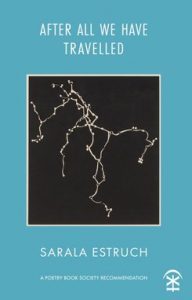
Poem from After All We Have Travelled by Sarala Estruch (Nine Arches Press, 2023)
I research the origins of the modern rose & discover
1. she is a crossbreed
2. of Rosa chinensis, Rosa gigantea & other species
3. including Rosa gallica & Rosa canina
4. of which, only the latter, is native to the British Isles
5. the rest were shipped from China, India, France
6. et cetera, et cetera…
7. Flower with a thousand faces, six thousand five hundred tongues
8. & almost as many names;
9. ancestors estimated at thirty-five million years old.
10. To where does she return?
11. She becomes what she is:
12. 玫瑰, गुलाब, rose.
Praise for After All We Have Travelled by Sarala Estruch (Nine Arches Press, 2023)
“Sarala Estruch in After All We Have Travelled unspools a cross-continental family history, and invites us in to share a story at once familiar and unique. What is most striking throughout is the clarity and vividness of the pictures she makes from distant memories, and the tug of conflicting, barely spoken emotions as she moves between countries, the now and the past, in language that is simple, elegant and always beguiling. If you’ve ever felt unmoored or adrift from your family – or even yourself – the poems here will help to ground you; in their lens they see you, see all of us.” – Rishi Dastidar
“After All We Have Travelled is a book of journeys and legacies, turnings and travails, which introduces us to a consummate storyteller, a poet of layers and depths. Sarala Estruch is unafraid of the fissures, the kinks, the binds, involved in piecing together one’s identity as a poet of mixed race and multiple heritages, through the fraught gifts of language. These poems dive into the pools of longstanding grief, of loss and estrangement across generations and continents. At once formally original and tremendously moving, this book charts the transformation of ‘a mouth / drowned at high tide’ who fights her way back up to air, learning to speak – and sing – again.” – Sarah Howe
“After All We Have Travelled follows a young woman discovering her own complex history across cultures and languages, religions and lost histories. Where family mythologies meet silence, memory gives an emotive reasoning, singing into the void left by death and distance, using the lyric voice of self-making. This book charts a new terrain, a multiplicity of being mapped for future generations whose relationship to home is as yet unknown to its forebears.” – Sandeep Parmar
“Sarala Estruch makes poems in whose shifting formal permutations the lyric is “at times a relief/ at other times intolerable”, in part because multiple time frames – generations flowing backwards from the poet’s children – are held together in the same shot, an image of unity ruptured by the punctum of the experiencing ‘I’. Language is a “cork, plug, stopper”, but the stoppered world is always about to burst through. So these poems overlap and speak – or relate – to each other endlessly, modelling a morally complex, temporally fluid, lyric approach to the family.” – Will Harris